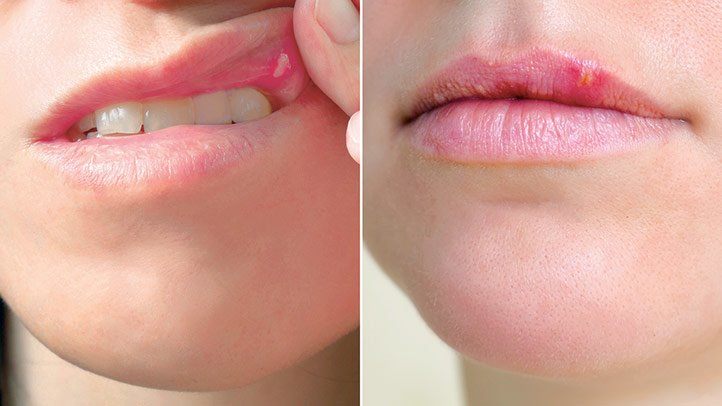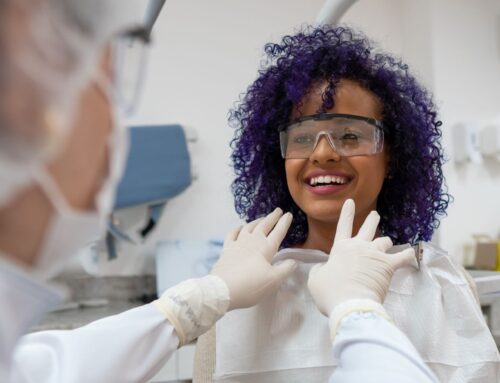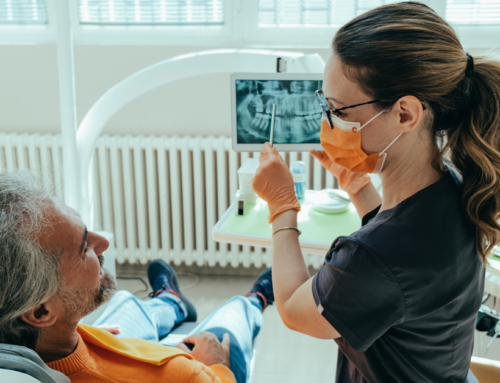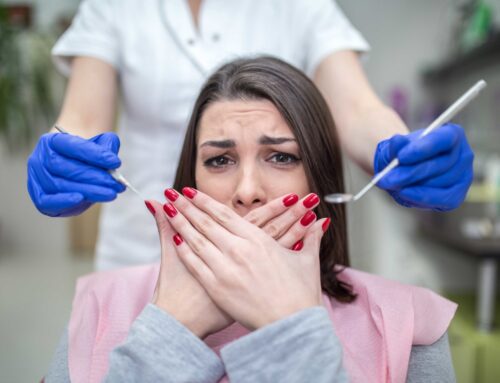Canker and Cold Sores – Natural Treatment Methods
Canker and cold sores are unpleasant, unsightly and can cause quite a bit of discomfort every time you eat, bite, chew or speak. They can hinder your desire to hang out with friends or your professional performance. Furthermore, the search for a remedy, including natural ones, can be frustrating.
So, how do you treat these painful sores? In the most severe instances, you can get a prescription but usually people are choosing between a variety of natural and over-the-counter options.
This article will help you determine the difference between a canker and a cold sore so you can know what you’re dealing with. We’ll then outline a comparison between the two with respect to causes and symptoms. Next, we’ll review the more common methods used to heal them and, ideally, prevent their recurrence.
Since these sores concern the mouth and can negatively impact one’s oral health, it is recommended that you mention the onset of any to your dentist and have them exam it during your next scheduled checkup.
What is a Canker Sore?
Canker sores are open sores usually situated on the inside of your cheeks, lips or tongue. Typically, they don’t form on gums except in rare instances. Starting as tiny bumps, canker sores tend to burst after a couple of days leaving a sore with a yellow or white hue surrounded by a red border. Additionally, they can grow in clusters.
What triggers canker sores is still the subject of much debate. Some believe it’s a viral infection whereas others believe it stems from an allergy to either food or medicine. There are also some schools of thought that believe it is caused by smoking, stress, low vitamin B12 or some combination of these factors. More women than men get canker sores, meaning their onset could be hormone related. Lastly, they are known to surface in the aftermath of a physical injury. As you can see they are still quite the mystery to the medical community.
If you are prone to having a dry mouth than you could also be susceptible to canker sores. The thing to watch out for and why you should mention any canker sore to your dentist or doctor, is that they could be a sign of something more serious like celiac disease or an autoimmune disorder. If you are experiencing consistent occurrences, then you should make a doctor’s appointment.
Most people just let them run their course, which can take up to two to three weeks. The good news—to use the term liberally—with canker sores is that they are not contagious. Additionally, they respond well to natural treatments if properly administered.
What is a Cold Sore?
Unlike canker sores, cold sores are contagious. They also differ from canker sores because their cause is known. It’s a strand of herpes referred to as simplex virus 1. It’s not sexually transmitted and generally quite different from genital herpes.
Also known as fever blisters, cold sores are small blisters that break, leak fluid and eventually become a scab. For days prior to their arrival, you could feel some tingling. Once a person becomes infected, the virus journeys up the nerve only to appear once triggered. After this occurs, it travels down a nerve to the mouth and appears on the outside usually near the corner.
Because they are visible, people tend to dig deeper and search harder for a cure than they do with canker sores. They typically heal on their own over the course of seven to 10 days. The pain will alleviate somewhat after the first day.
Managing Pain and Further Aggravation
For mouth sores, most people rely on over-the-counter medications like Tylenol or benzocaine to manage the pain. It is recommended to avoid any nonsteroidal anti-inflammatory drugs (NSAIDs) like Ibuprofen. Surprisingly, in some cases, these have been known to cause canker sores.
You will also want to check your toothpaste and mouthwash to make sure they don’t contain an ingredient called sodium lauryl sulfate which are known to aid in the formation of canker sores.
Make sure you avoid aggravating a canker sore by doing the following:
- Don’t poke at it with your tongue. Yes, we know it’s tough but really try.
- Don’t eat any spicy or acidic food.
- Drink lots of water.
- Commit to a healthy diet.
- Do whatever you can to alleviate stress, i.e. meditate, exercise, read.
- Take a daily multivitamin.
- Carefully brush your teeth.
Sores can stick around for longer if you don’t follow the rules.
Natural Treatment Solutions
Natural remedies aren’t just a great way to save money, they are a safe and effective way to treat canker and cold sores. The oldest natural remedy, and yes it works, is to rinse your mouth with a solution comprised of salt, baking soda and water.
Here are some natural canker sore remedies that are worth trying:
- Sea Salt Rinse/Gargle – Use 2 teaspoons of natural sea salt with 2 cups of room temperature filtered water – gargle liberally for 1-2 minutes, 3 times per day.
- Watermelon frost that is sold as a spray or in tablet or powder form. You simply apply it to the sore and it should help it heal and relieve some of the pain.
- Fenugreek Leaves, which offers a variety of benefits to one’s health. Add some to your meals or a teaspoon of fenugreek seeds to cold water and gargle.
- Basil contains anti-microbial properties that are known to combat infections. You can include this ingredient in your pizza or pasta or you can simply chew on the leaves.
- Cayenne pepper contains capsaicin that is proven to stop the growth of bacteria. Use it to season your food or mix with water to make a paste.
- Hydrogen peroxide has been in use for some time as a mouthwash substitute to treat canker sores. Mix ¼ peroxide with ¼ water, one teaspoon of baking soda and one teaspoon of sea salt.
If you have a cold sore, then give these natural supplements a shot as they can impede infections:
- Vitamin E decreases inflammation and contains antioxidants.
- Vitamin C has properties that increase the blood’s white cell count to heal cold sores.
- Zinc which can be found in eggs, chicken, turkey and yogurt, among other foods.
- Echinacea tea to boost your immune system and reduce pain.
- Ice or a cold compress to heal redness and lower the amount of blood flowing to the sore.
- Peppermint, vanilla, tea tree or lemon balm oils can be effective as their inhibitory activity could shield the body against the viruses that cause cold sores. Works best when taken during the early stages.
Unless you’ve already tried all these methods to no avail, we recommend giving them a go before investing time and money in pharmaceuticals.
Over-the-Counter Options
If you want to go the over-the-counter route than you can try one of the following on your canker sore:
- Anbesol
- Kan-A
- Orabase
- Zilactin-B
- Lidex
- Vanos
- Orajel Antiseptic Mouth Sore Rinse
- Peroxyl
For cold sores, these are some of the more popular and trusted products available at most pharmacies:
- Abreva
- Releev
- Zilactin
- Herp Rescue
- Compeed
Whatever option you choose, be sure that you aren’t allergic to any ingredient. The last thing you want is a rash to match your cold sore.
Book an Appointment Today!
We hope this article helps you overcome a stubborn canker or cold sore. If you’re looking for a new dentist in the Barrie area, call us at 705-999-5310 or complete this short form to book your initial consult.
Appointment Request
If you’re interested in any of our procedures, and would like to meet with one of our dentists to discuss options, costs and get additional information, complete this short form and we’ll give you a call to arrange for a no-obligation appointment at our Barrie clinic.










